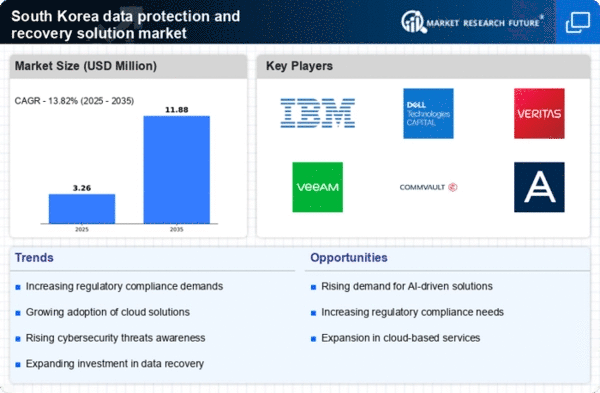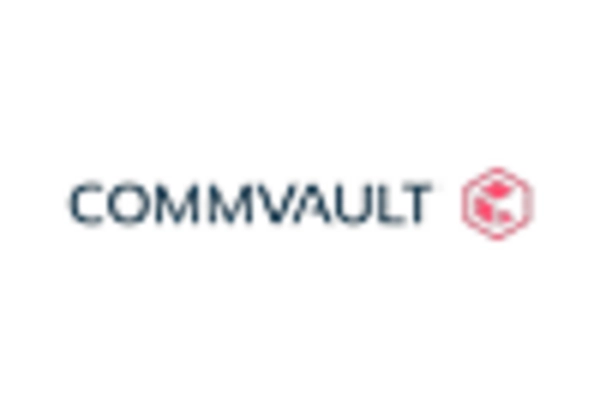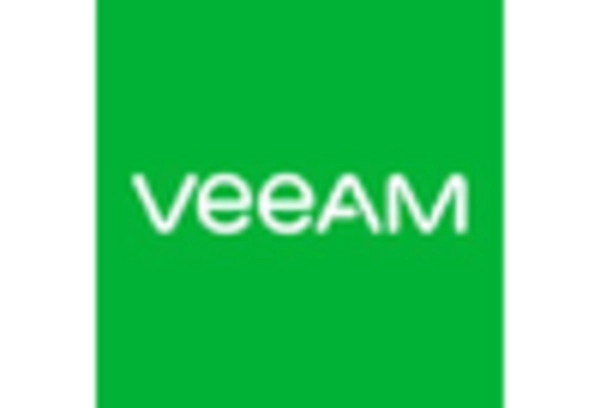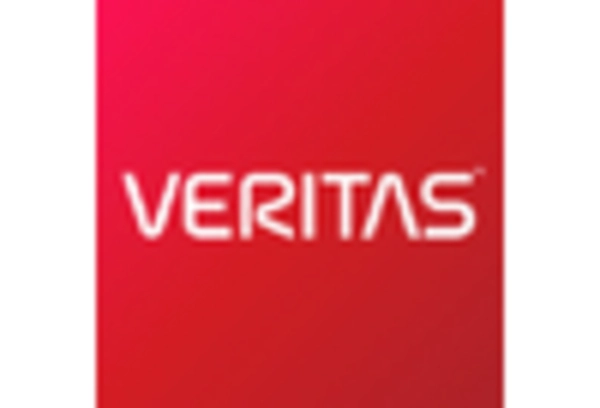Growing Data Volume
The exponential growth of data generated by businesses in South Korea is a critical driver for the data protection-recovery-solution market. With the rise of IoT devices and digital transformation initiatives, organizations are accumulating vast amounts of data, necessitating effective protection and recovery solutions. In 2025, it is anticipated that the total data generated in South Korea will reach approximately 30 zettabytes, creating challenges in data management and security. This surge in data volume compels companies to adopt advanced solutions that can efficiently handle data protection and recovery processes. Consequently, the market is expected to expand significantly, as organizations prioritize investments in technologies that can safeguard their growing data assets.
Rising Cybersecurity Threats
The data protection-recovery-solution market is experiencing heightened demand due to the increasing frequency and sophistication of cyberattacks in South Korea. Organizations are compelled to invest in robust data protection strategies to safeguard sensitive information. In 2025, it is estimated that cybercrime could cost businesses globally over $10 trillion annually, with South Korea being a significant target due to its advanced digital infrastructure. This alarming trend drives companies to seek comprehensive recovery solutions that can mitigate risks and ensure business continuity. As a result, the market is likely to witness substantial growth, with a projected CAGR of 12% over the next five years, reflecting the urgent need for enhanced data security measures.
Increased Awareness of Data Privacy
The data protection-recovery-solution market is benefiting from a growing awareness of data privacy among consumers and businesses in South Korea. As individuals become more conscious of their personal information and its potential misuse, organizations are under pressure to implement stringent data protection measures. Legislative frameworks, such as the Personal Information Protection Act (PIPA), have heightened the focus on compliance, driving demand for effective recovery solutions. In 2025, it is projected that 75% of South Korean companies will prioritize data privacy initiatives, leading to increased investments in data protection technologies. This trend indicates a robust market growth trajectory, as businesses seek to align with consumer expectations and regulatory requirements.
Shift Towards Remote Work Environments
The shift towards remote work environments in South Korea is a significant driver for the data protection-recovery-solution market. As organizations adapt to flexible work arrangements, the need for secure data access and protection becomes paramount. Remote work increases the risk of data breaches and loss, prompting companies to invest in comprehensive recovery solutions that can protect data across various locations. In 2025, it is anticipated that 80% of South Korean businesses will implement remote work policies, further emphasizing the necessity for robust data protection measures. This trend is likely to stimulate market growth, as organizations prioritize investments in solutions that ensure data security in a distributed work environment.
Technological Advancements in Data Solutions
The data protection-recovery-solution market is significantly influenced by rapid technological advancements in data management and security solutions. Innovations such as machine learning, blockchain, and advanced encryption techniques are reshaping the landscape of data protection. In South Korea, the adoption of these technologies is expected to enhance the effectiveness of recovery solutions, making them more efficient and reliable. By 2025, it is estimated that 60% of organizations will integrate AI-driven solutions into their data protection strategies, reflecting a shift towards more proactive and intelligent recovery mechanisms. This technological evolution is likely to propel market growth, as businesses seek to leverage cutting-edge solutions to safeguard their data.
















